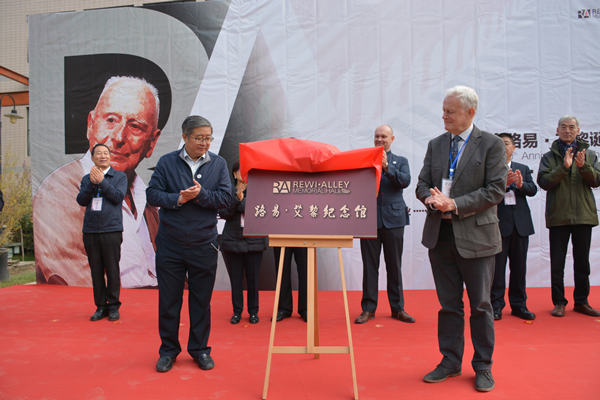 |
|
Bromwich joins the opening ceremony of the Rewi Alley Memorial Hall at Lanzhou City Univesity, Oct 30, 2017. [Photo provided to Chinaculture.org] |
Chinese food is a Chinese culture that most of us feel we are familiar with. Underlying the creation of dishes is the philosophy of creating balance, through a simple combination of a range of different elements. Sweet and sour is a well-known example of apparently opposing tastes, but different textures and color combinations are also valued.
Chinese traditional ink paintings are simple in presentation, but rich in images of the natural environment that mimic human nature. To fully appreciate Chinese art, these elements need to be understood. The bamboo is a symbol of elegance, and the hollow stem suggests modesty. The plum blossom is an element representing nobility and strength, emerging while the snow is still on the ground.
Confucius' contribution to Chinese society also provides a difference to Western society. Eastern and Western philosophical aspects of society have a similar time span from Confucian and Greek times forward, but the confluence is minimal. Put very basically, Eastern society places the community, or a concept of a big family, as the most important component of society. This can place all considerations of social issues in a subjective framework.
In Western society, it is the individual that is considered to be the unit of society, compatible with an objective analysis of issues.
I like to question people, "Considering a monkey, cow and banana, which is the odd one out?" Monkey, cow, banana. The vast majority of Chinese will choose the cow as the odd one out because of the relationship between the monkey and the banana! The monkey eats the banana, so the banana gives sustenance to the monkey. Western people invariably see the banana as the odd one out because they see the objective classification of the monkey and cow, with both being animals. The consideration of these two responses, and extension into deeper philosophical understanding, presents a major difference between Chinese and Western thought. Chinese have a much stronger sense of community and the interrelationship of things, compared to an individualistic approach.
Confucian scholar Mozi promotes a concept of "da ai", a big love or, more appropriately, respect for others and things. If expressed in an altruistic way, this makes for an easy, positive unification of people, countries, man and nature. Embracing an eco-civilization and the Belt and Road Initiative are examples of the potential this unification can offer.
The challenge to the West is to embrace an alternative perspective on issues. It is time for Western media to seek a balance in reporting affairs, and critique the Western perspective. It is time for a Chinese voice to be allowed to be heard in the West. Then public opinion can begin to adopt an appreciation of what China has to offer. Understanding Chinese culture has become indispensable to appreciate the complex world where China plays an increasingly crucial role. Leaders need this understanding.
Only then will a harmonious global order be allowed to develop freely, and the global consensus can become a peaceful one, and conflict diminished. We are in this for the longer time frame.
The author is the president of New Zealand China Friendship Society.